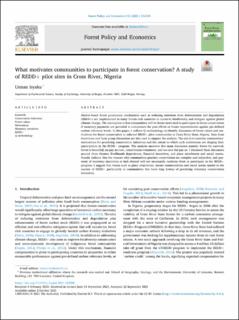| dc.contributor.author | Isyaku, Usman | |
| dc.date.accessioned | 2022-02-03T09:36:40Z | |
| dc.date.available | 2022-02-03T09:36:40Z | |
| dc.date.created | 2021-10-15T14:16:04Z | |
| dc.date.issued | 2021 | |
| dc.identifier.issn | 1389-9341 | |
| dc.identifier.uri | https://hdl.handle.net/11250/2976801 | |
| dc.description.abstract | Market-based forest governance mechanisms such as reducing emissions from deforestation and degradation (REDD+) are implemented in many forests rich countries to conserve biodiversity and mitigate against global climate change. The assumption is that communities will be better motivated to participate in forest conservation if monetary payments are provided to compensate for past efforts or future improvements against pre-defined carbon reference levels. In this paper, I utilized Q methodology to identify discourses of forest values and motivations for forest conservation in selected REDD+ pilot communities in Cross River State, Nigeria. Data from interviews and focus group discussions are also used to support the analysis. The aim is to examine communities' motivations for practicing conservation initiatives and the extent to which such motivations are shaping their participation in the REDD+ program. The analysis uncovers five main discourses namely: forest for survival, forest is beautiful, no pay no care, conservation volunteers, and we care but pay us. I discussed these discourses around three themes: livelihoods dependence, financial incentives, and place attachment and social norms. Results indicate that the reasons why communities practice conservation are complex and subjective, and payment of monetary incentives or lack thereof will not necessarily motivate them to participate in the REDD+ program. I suggest that values such as place attachment, nature connectedness and social norms matter in the success of REDD+ particularly in communities that have long history of practicing voluntary conservation initiatives. | en_US |
| dc.language.iso | eng | en_US |
| dc.publisher | Elsevier | en_US |
| dc.rights | Navngivelse 4.0 Internasjonal | * |
| dc.rights.uri | http://creativecommons.org/licenses/by/4.0/deed.no | * |
| dc.title | What motivates communities to participate in forest conservation? A study of REDD+ pilot sites in Cross River, Nigeria | en_US |
| dc.type | Journal article | en_US |
| dc.type | Peer reviewed | en_US |
| dc.description.version | publishedVersion | en_US |
| dc.rights.holder | Copyright 2021 The Authors | en_US |
| dc.source.articlenumber | 102598 | en_US |
| cristin.ispublished | true | |
| cristin.fulltext | original | |
| cristin.qualitycode | 1 | |
| dc.identifier.doi | 10.1016/j.forpol.2021.102598 | |
| dc.identifier.cristin | 1946251 | |
| dc.source.journal | Forest Policy and Economics | en_US |
| dc.identifier.citation | Forest Policy and Economics. 2021, 133, 102598. | en_US |
| dc.source.volume | 133 | en_US |

